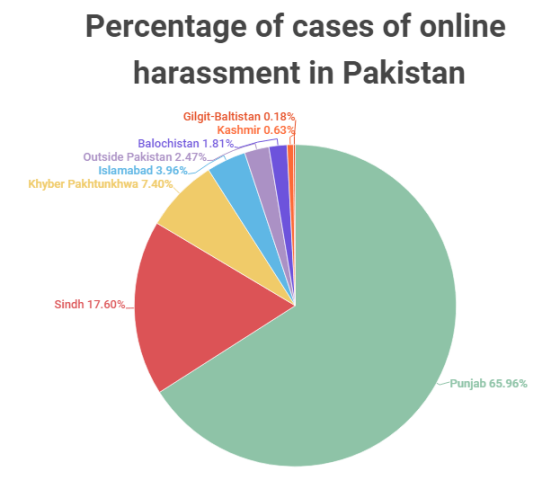Punjab reports most harassment, WhatsApp, Facebook top platforms to blame: DRF
4 min readPeople in Punjab made the most calls to the Digital Rights Foundation cyber harassment helpline over the last five years, the watchdog reported Wednesday.
The DRF, which works on privacy and online harassment, has released five years worth of data. Punjab had 2,515 cases. The DRF found that overall people reaching out to its helpline said that WhatsApp and then Facebook were where the harassment was taking place.
Harassment is happening most to the 18 to 30 year olds and to women.

The DRF has made recommendations for policymakers and law enforcement agencies in the report and highlighted some case of women journalists such as Aaj News’ Asma Shirazi who have been abused online.
The helpline has received a total of 11,681 cases in the last five years. In 2021, there were 4,441 which comes to an average of 370 cases per month with a significant rise between March and September.
Punjab had 66% of total reported complaints. This was followed by a much lower 671 cases reported from Sindh and then 282 from Khyber Pakhtunkhwa. The number of cases from Islamabad and outside Pakistan were 151 and 94, respectively.
Around 69 cases have been reported from Balochistan and 24 from Kashmir. A total of 7 complaints were reported from Gilgit-Baltistan.
The DRF found that a number of people called to discuss cyber harassment without making any complaint. The majority of calls – 32.5 percent, came from places where there is no FIA office. And 22.7 percent and 15 percent of callers were from Pakistan’s two main cities, Lahore and Karachi, respectively.

A whopping 60 percent of reported cases were linked to social media platforms and direct messaging applications. WhatsApp topped the list with over 1,258 complaints of harassment, followed by Facebook with 1,014 complaints.

Overall 68% of calls received were from women and less than half or 30% were from men and 1% was by gendered minorities.
DRF’s executive director Nighat Dad stated, “The pace at which the cases of cyber harassment are increasing is alarming.” She added that appropriate action is needed to make the internet a safe and equal space for everyone. “Unless all key players take the measures for structural change, we will continue to replicate the same discriminatory behaviors against vulnerable groups that we see and experience offline.”
Aaj News anchor Asma Shirazi shared her experience: Recently, as a response to my column about the policies of the Government, I received massive and violent online propaganda against me which was trending on Twitter for several days. My character was assassinated, I was declared a foreign agent and also received filthy abuse against both myself and my family. These were coming from multiple accounts, so how much can we fight with them especially when they are sitting behind their keyboards?
The cyber harassment helpline was launched on December 1, 2016, and is the region’s first helpline for online violence with gender-sensitive, confidential and free services. The helpline provides legal advice, digital assistance and basic psychological assistance through a proper referral mechanism. The toll-free number (0800-39393) is available from Monday to Sunday, 9 am till 5 pm and extends its services over email and DRF’s social media platforms.
Cyber harassment helpline manager Hyra Basit noted, that “along with the rise in engagement with digital spaces, Pakistan is witnessing a rise in harassment that reflects patriarchal and misogynistic roots in the offline world.”
Blackmail (893 complaints) was reported in 2021 and 727 cases were for the non-consenting use of images.
DRF calls for regular 6 months reporting in accordance with Section 53 of Prevention of Electronics Crimes Act (PECA) and its accessibility to the public.
DRF says online defamation must be decriminalised by repealing Section 20 PECA which is regularly used to silence survivors of harassment and assault.
For LEAs, the helpline recommends greater mechanisms to deal with cases in foreign jurisdiction which has also been mentioned in Section 1(4) of PECA. The report also calls for greater assurance of confidentiality as a prerequisite for reporting which is also mentioned under Rule 9 of the PECA Rules by the Federal Investigative Authority (FIA).
Digital Rights Foundation is a registered research-based NGO in Pakistan. Founded in 2012, DRF focuses on ICTs to support human rights, inclusiveness, democratic processes, and digital governance. DRF works on issues of online free speech, privacy, data protection and online violence against women.
For the latest news, follow us on Twitter @Aaj_Urdu. We are also on Facebook, Instagram and YouTube.
























Comments are closed on this story.